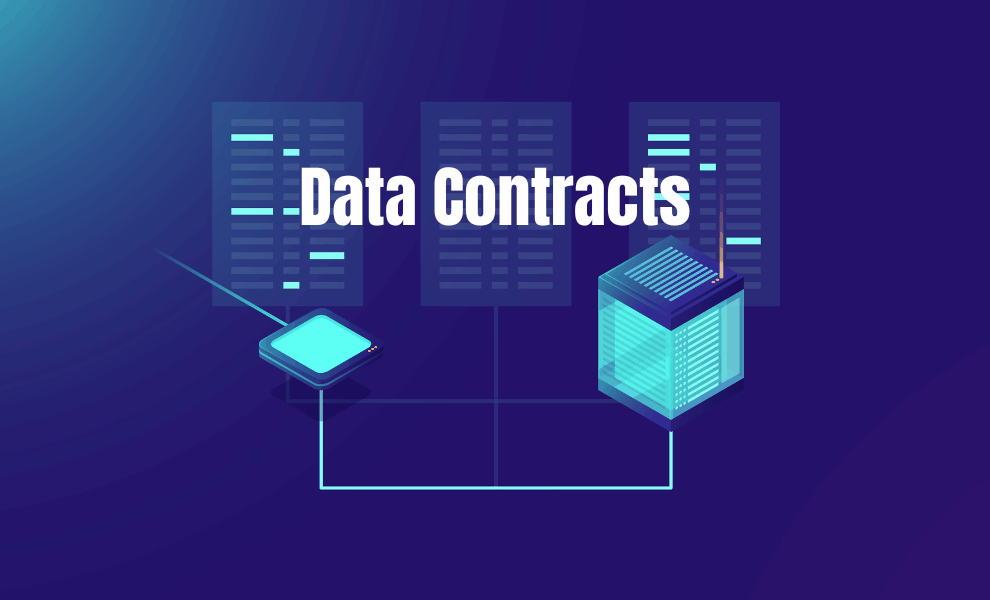Data is the everyday word, applicable to any sector. Manufacturing, healthcare, banking, e-commerce, and the list continues. It is one of the crucial factors that’s driving changes today. How can we not count on AI? Yes, it fuels AI systems capable of performing all complex tasks. However, the success of such systems is entirely linked to one factor, which is data quality. Unstable or improperly managed data may result in workflow interruptions, inaccurate insights, and lack of confidence between the teams.
Do you know there is one solution to this challenge? Data contracts are the solutions! They are legal agreements between data producers and consumers, helping to boost reliability, accuracy, and consistency throughout the data pipeline. To help you better understand the concept, we’ve curated this blog for you! Let’s dive in and check out what’s in here for you!
A Glimpse of Data Contracts in Data Pipelines
A data contract is a legal, machine-readable agreement between the owner of a secure system and the data engineering team responsible for extracting, transforming, and loading data.
It lays down the format, outline, and anticipations of the data being shared between systems. According to the definition of James Densmore in Data Pipelines Pocket Reference, it is common to find the following in a data contract:
- Which data is being extracted
- The method of its extraction (e.g, Change Data Capture)
- How frequently it is ingested
With the definition of such contracts, a team can eliminate ambiguity and undocumented assumptions, ensuring smooth collaboration along the data pipeline.
What is the Importance of Data Contracts?
Traditional data architecture was monolithic, with the central data team handling all data, including that generated by other teams. However, the key point is that modern enterprises are transitioning towards a model of distributed data ownership, where domain teams assume full responsibility for the quality and data governance of their data products. Data contracts are the key pillar of the responsibility and partnership between producers and consumers.
The Key Benefits of Data Contracts in Data Quality Management
Below we have listed some of the key benefits of data contracts:
1] Improve Quality of Data: Data is validated by the producers at the source, which helps lower downstream issues.
2] Checks of shift quality: It ensures that data quality is checked at an early stage of the lifecycle, rather than on the analysis side.
3] Empowers platform teams to develop frameworks and tools for validation, replacing manual monitoring.
4] Develops Good Cooperation: Enhances open communication and culture of feedback between consumers and producers of data.
How is Data Contract Implemented?
Educate Sensitivity and Training
Make sure that the stakeholders, including the engineers and non-technical departments, such as sales and operations, are informed of the purpose, concepts, and responsibilities of the data contracts. The awareness generated at the beginning of the process can help to maintain a perfect balance between the departments.
Involve All Stakeholders
Teamwork is the secret of success! Build the right teams comprising data producers, software engineers, scientists, and analysts to decide and consent on the terms of the contract to be implemented.
Communication that Makes a Difference
Write down words and expectations. Lack of communication between teams can result in inappropriate data conformity or integration breakdowns.
Take Follow-ups Regularly
Data contracts aren’t static. Monitor closely to ensure compliance and accuracy with regulatory and governance standards. At this point, data observability tools may work synergistically in automated tracking and validation.
Listing Down the Applications of Data Contracts
- Data contracts can be utilized to monitor live data streams within the production system.
- Data contracts can help developers prevent schema or format modifications that destabilize downstream components. You will also ensure seamless software updates and integrations, as the data structure will be verified earlier.
- Data contracts define the behavior of data, whilst data catalogs describe the existence of data. Combined, they enhance the discoverability and comprehensibility of data, providing deeper context to data asset consumers within a team.
Challenges Occurring Data Contract Implementation
Even though the context of data contracts comes with great benefits, organizations might face challenges that include:
- Creating team alignment in meeting various priorities and technical capabilities.
- Controlling versioning in changing business needs.
- Sustaining governance in multiple systems.
Coming to an End!
Data contracts are not just technical documents; they are collaborative structures that combine data transactions by sharing standard requirements of data quality, consistency, and governance. But when implemented properly, data contracts help to:
- Enhance the quality and credibility of data
- Enhance cross-teamwork
- Promote regulatory adherence
- Build a scalable data system
That’s all about data contracts! Hope you now understand the concept.
Check out our blog section now and be ahead of the competitive world!
FAQs
Q1. What are the three important stages in data contracts?
Ans: The three main stages in data contracts are: ingestion, processing, and storage of data.
Q2. What is an example of a data pipeline?
Ans: Here is an easy example of a data pipeline: It is a process wherein data is transferred from the source to the destination database.
Recommended For You:


